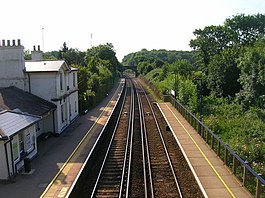Stonegate railway station
| Stonegate |
|
|---|---|
 |
|
| Location | |
| Place | Between Witherenden Hill and Stonegate in the parish of Ticehurst |
| Local authority | Rother |
| Coordinates | 51°01′12″N 0°21′50″E / 51.020°N 0.364°ECoordinates: 51°01′12″N 0°21′50″E / 51.020°N 0.364°E |
| Grid reference | TQ658271 |
| Operations | |
| Station code | SOG |
| Managed by | Southeastern |
| Number of platforms | 2 |
| DfT category | E |
| Live arrivals/departures, station information and onward connections from National Rail Enquiries |
|
| Annual rail passenger usage* | |
| 2011/12 |
|
| 2012/13 |
|
| 2013/14 |
|
| 2014/15 |
|
| 2015/16 |
|
| History | |
| Original company | South Eastern Railway |
| Pre-grouping | South Eastern and Chatham Railway |
| Post-grouping | Southern Railway |
| 1 September 1851 | Opened as Witherenden |
| December 1851 | Renamed Ticehurst Road |
| 16 June 1947 | Renamed Stonegate |
| National Rail – UK railway stations | |
| * Annual estimated passenger usage based on sales of tickets in stated financial year(s) which end or originate at Stonegate from Office of Rail and Road statistics. Methodology may vary year on year. | |
|
|
|
Stonegate railway station is on the Hastings Line in East Sussex in England. Train services are provided by Southeastern.
The typical off-peak service is one train per hour to London Charing Cross via Tunbridge Wells, and one train per hour to Hastings.
The South Eastern Railway route between Tunbridge Wells and Hastings was authorised in 1846 (9 & 10 Vic. cap. LXIV), and opened in stages: the section between Tunbridge Wells and Robertsbridge was opened on 1 September 1851. One of the stations opened the same day was originally named Witherenden (the name of a nearby hamlet), but was renamed in December the same year to Ticehurst Road. It became Stonegate (after a village about 1 mile away) on 16 June 1947.
On 13 April 2014, it emerged that Jonathan Burrows, a BlackRock fund manager travelling from the station, had dodged an estimated £42,550 over five years in season ticket fares to London by using an unvalidated Oyster card and avoiding ticket inspectors. It is believed to have been the highest fare dodge known in Britain.
...
Wikipedia
